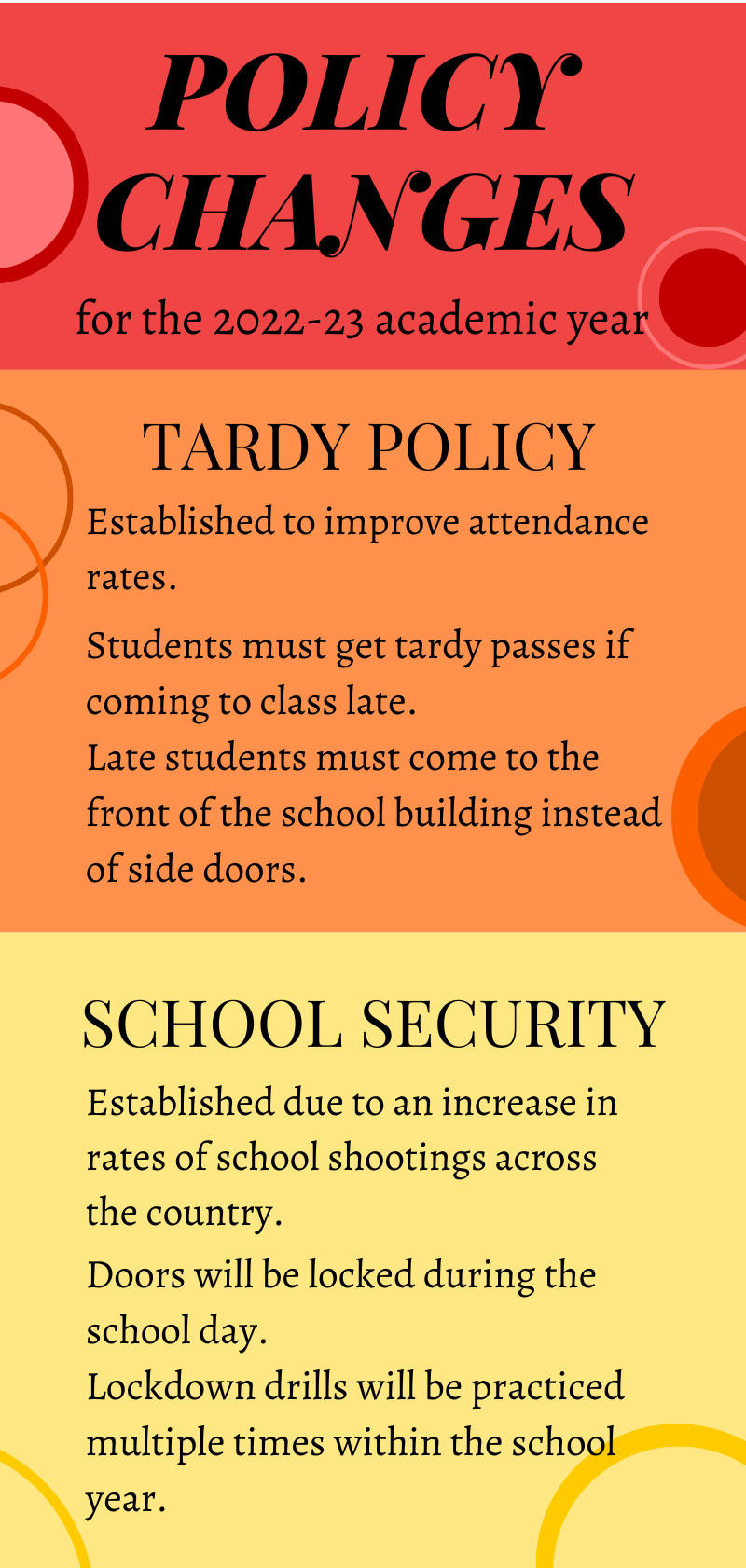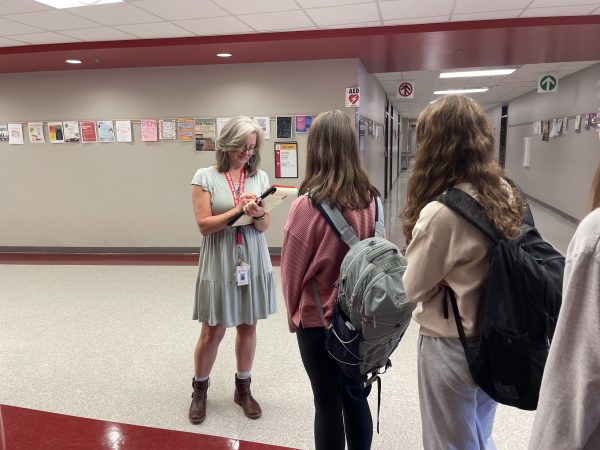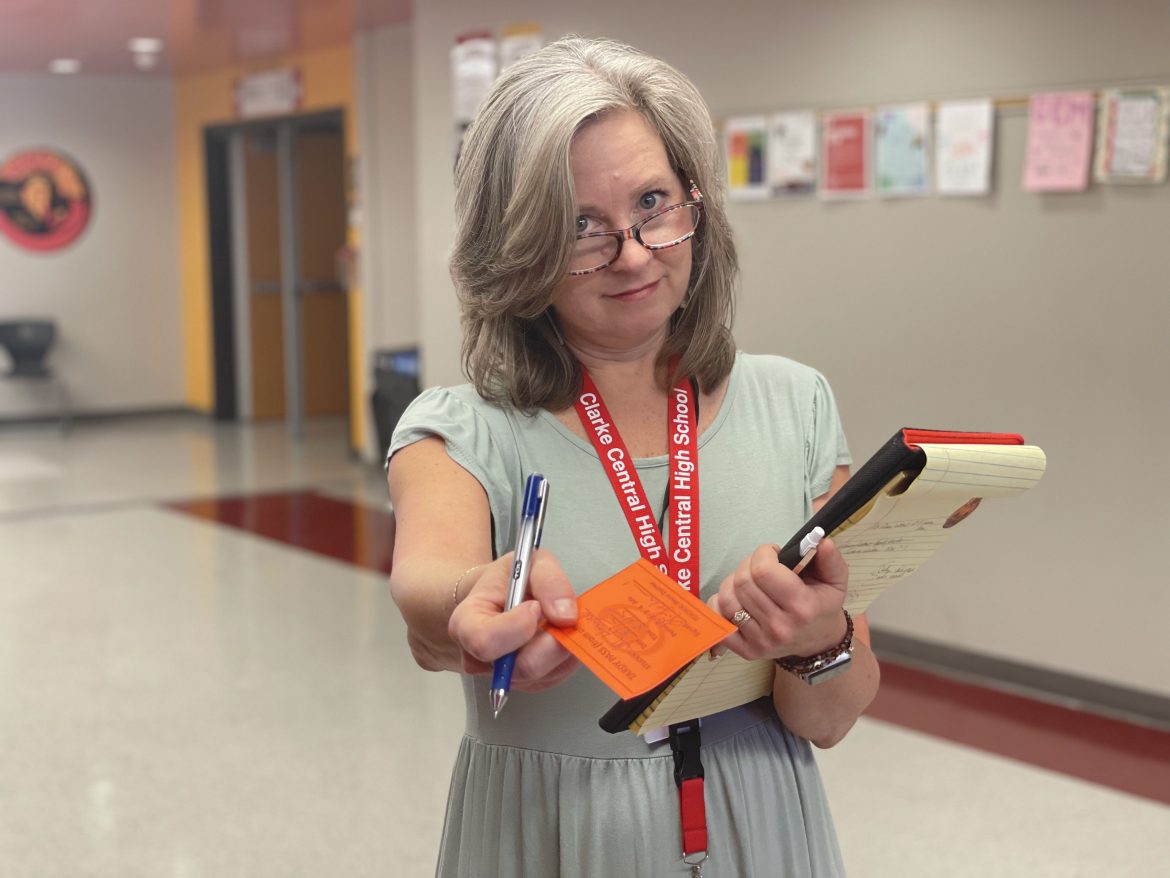Clarke Central High School Instructional Coach Ginger Lehmann holds out a tardy pass to a late student on Oct. 6. Two new protocols were enacted to better protect students at CCHS, including keeping both internal and external doors locked and an updated tardy policy that requires students to receive a tardy pass. “We have expectations with keeping the doors locked. That’s to keep students safe,”CCHS Principal Dr. Swade Huff said. “It’s all just to be proactive. The approach that the (Clarke County School District) has taken to hold us accountable, to make sure that we are being proactive and taking measures to keep everybody safe, I definitely support.” Photo by Robert Lee Neeley III
New safety measures were enacted at the beginning of the 2022-23 school year in order to protect those in the building.
At the start of the 2022-23 school year, two policy changes were made for several different purposes including student safety. These changes were announced in grade-level assemblies that took place during the first two weeks of school.
Clarke Central High School’s administrative team informed students of the new tardy policy, as well as the new security measures intended to protect those at the school.
“Last year, it would be nine o’clock (in the morning), and (administrators would) stand in the old main entrance and it looked like a party. There were 100 kids in the hallway coming to class at nine o’clock and that’s not happening this year.”
— Dr. Summer Smith,
Clarke Central High School Associate Principal

An infographic depicts the Clarke Central High School 2022-23 academic school year policy changes, highlighting tardy policy and school security. Due to nationwide safety concerns and local disruptions in attendance rates, the CCHS administration has implemented several changes among their policies. “Because of the heightened awareness in regards to the mass shootings that we’ve seen or experienced over the past couple of years has definitely elevated urgency to make sure that we’re saving our school communities,” CCHS Principal Dr. Swade Huff said. Infographic by Maya Shrivastav
“Students should not open doors to allow other students access to the building if they’re late so (they’re) required to walk around to the main building,” CCHS Principal Dr. Swade Huff said. “(The tardy policy) is to help kids have an awareness of getting to class on time, but at the same time, keeping our school campus safe.”
According to CCHS Associate Principal Dr. Summer Smith, the new measures have already brought about significant results in mitigating hallway congestion.
“Last year, it would be nine o’clock (in the morning), and (administrators would) stand in the old main entrance and it looked like a party,” Smith said. “There were 100 kids in the hallway coming to class at nine o’clock and that’s not happening this year.”
“(The tardy policy) is to help kids have an awareness of getting to class on time, but at the same time, keeping our school campus safe.”
— Dr. Swade Huff,
Clarke Central High School Principal
Huff states that the purpose of the new measures comes from the increase of mass shootings taking place in schools all over the country.
“The heightened awareness in regards to the mass shootings that we’ve seen or experienced over the past couple of years has definitely elevated urgency to make sure that we’re safe in our school communities,” Huff said. “We are going to have several different drills this year and that is just to prepare us in the event that something should happen on our school campus. It’s a sad situation, but it’s the reality of our world.”
After an event occurs, such as a lockdown or administrative hold, there is a communication protocol approved by the Clarke County School District to inform the school community regarding the incident.
“Dr. Huff is always the person who oversees our communication,” CCHS Associate Principal Dr. Cindi Lowe said. “But as you can imagine, in any type of event, communication is carefully controlled for a variety of reasons: to keep people during the event safe (and) to make sure that the information going out is accurate.”
Junior Thea Richards understands the need for privacy but feels students have a right to know, to some extent, what happened after an event occurs.

Late students wait in the hallway to receive tardy passes on Oct. 6. The tardy policy was established to improve attendance rates, but also to contribute to school safety. “If kids are tardy, they have to go to (one of) several locations (in the school) to get a tardy pass. Once the bell rings, teachers are supposed to shut the doors,” Clarke Central High School Principal Dr. Swade Huff said. “It is an opportunity for us to help kids to understand that if you’re on time you’re late, and that’s just a life skill that we all need.” Photo by Robert Lee Neeley III
“I think it’s better to have everyone in a space where (the students) know at least some extent of what is going on within the building we’re in instead of just keeping us totally blind. The least they should do is have (an) email sent to the students about what happened,” Richards said. “We don’t need to know exactly who was hurt or who came into the building if that was the situation, (administration) could just easily tell us, ‘Hey, students, just so you’re aware. A non-student individual came into the building today who was not authorized to do so.’”
Richards believes that a lack of communication with students could lead to more disruption and negative consequences.
“If (administration doesn’t) tell (students what happened) everyone starts talking about it. Like, ‘(Do) you remember what happened at school today? I wonder what that was?’” Richards said. “It becomes a much bigger thing than it needs to be and that could potentially be triggering for the people that were affected by it.”
While Smith recognizes a desire for students to receive communication from the administration, she emphasizes a need for trust in the process.
“There are situations that we deal with that aren’t privy to everybody’s knowledge and don’t need to be because of privacy for victims, offenders or whatever,” Smith said. “Part of that is we just have to be okay with the understanding that the people that are put in charge of the school, have your safety as our No. 1 concern and that’s what we actively do every day. If it’s something we can tell, we tell it.”
